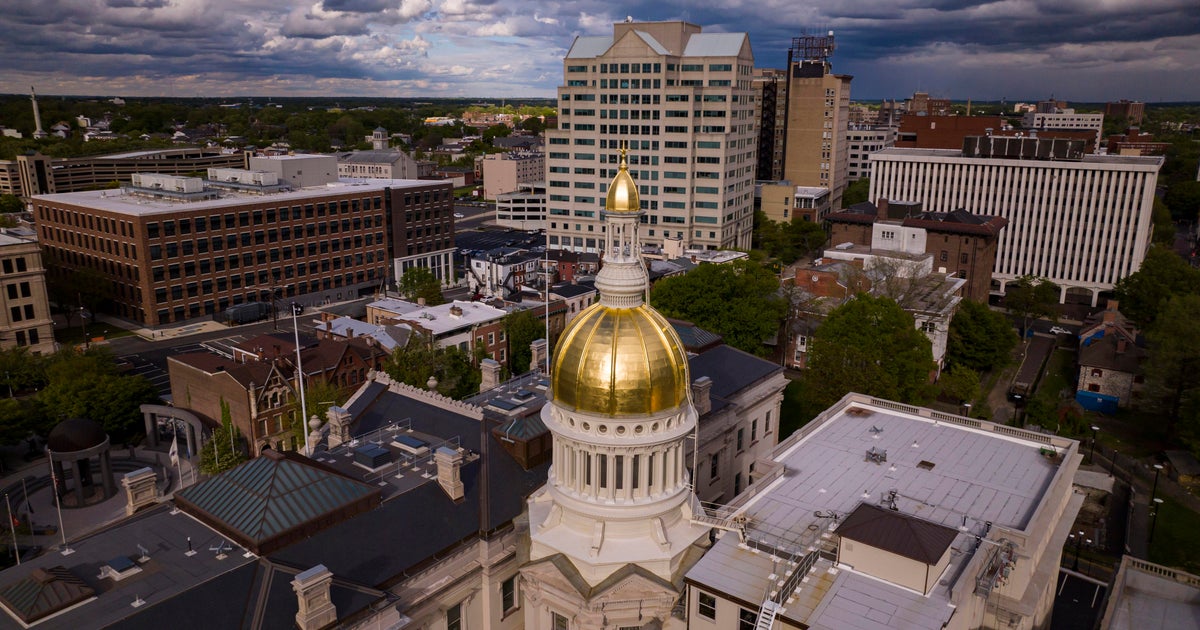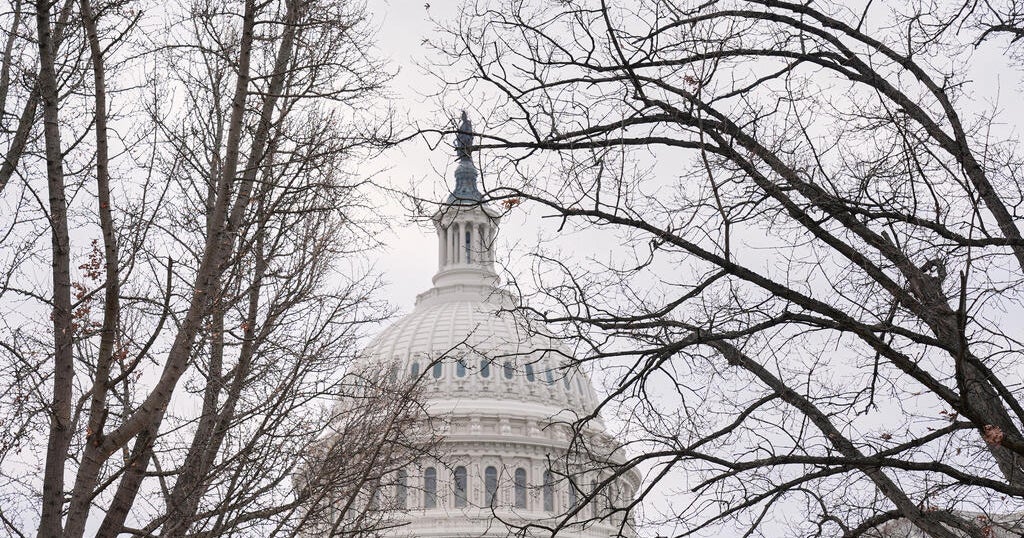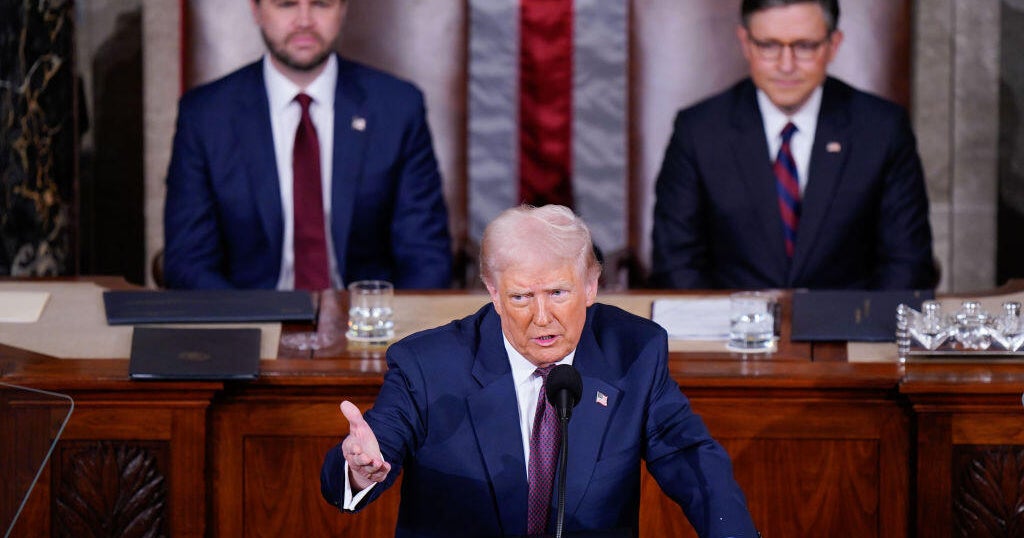Trump Signs New Revised Travel Ban Temporarily Halting Entry From 6 Muslim-Majority Nations
WASHINGTON (CBSNewYork/AP) -- President Donald Trump on Monday privately signed a revised travel ban that temporarily halts entry to the U.S. for people from six Muslim-majority nations who are seeking new visas and suspends the country's refugee program, White House spokesman Michael Short said.
The new directive aims to address legal issues that arose from the original order, which was blocked by the courts.
The president signed the revised order in the Oval Office, his spokesman tweeting out a photo of the moment -- a far cry from a month ago, when Trump signed the first version of the order in front of news cameras at the Pentagon.
Secretary of State Rex Tillerson called the new order "a vital measure" for strengthening the nation's security.
"It is the president's solemn duty to protect the American people and with this order, President Trump is exercising his rightful authority to keep our people safe," Tillerson said.
The revised order is narrower and specifies that a 90-day ban on people from Sudan, Syria, Iran, Libya, Somalia and Yemen does not apply to those who already have valid visas.
Instead of an indefinite ban on refugees from war-torn Syria, CBS2's Tony Aiello reports the order calls for a 120-day ban.
"Like every nation, the United States has a right to control who enters our country and to keep out those who would do us harm," Attorney General Jeff Sessions said.
Sessions said three of the nations are state sponsors of terrorism, and the other three have served as safe havens for terrorist countries.
"This executive order responsibly provides a needed pause so we can carefully review how we scrutinize people coming here from these countries of concern," Sessions said. "The Department of Justice believes that this executive order, just like the first executive order, is a lawful and proper exercise of presidential authority."
Homeland Security Secretary John Kelly said the order should not be called a "travel ban."
"We've always looked at it as a pause from those seven nations, now six, until we can get our arms around exactly how good we can vet individuals from those countries," Kelly said.
Kelly also said the ban was necessary for national security.
"We are not immune to terrorist threats and our enemies often use our own freedoms and generosity against us," Homeland Security Secretary John Kelly said. "We cannot risk the prospect of malevolent actors using our immigration system to take American lives."
Senate Minority Leader Charles Schumer (D-N.Y.) opposed the ban and said it must be repealed.
"Despite the Administration's changes, the #MuslimBan2 makes us less safe, not more, it is mean-spirited & un-American. It must be repealed," he wrote on Twitter. "Americans need to know that this latest Exec Order has absolutely nothing to do with national security. It is still a ban."
The White House also dropped Iraq from the list of banned countries. Iraq was originally included on the list of banned countries. It was removed from the order after agreeing to increase cooperation with the U.S. government on vetting of its citizens applying for a travel visa.
Iraq said the decision sends a "positive message'' about the future of bilateral relations as the two countries work to combat the Islamic State group. Government spokesman Saad al-Hadithi said it shows there is a "real partnership'' between Washington and Baghdad.
"Iraq is an important ally in the fight to defeat ISIS, with their brave soldiers fighting in close coordination with America's men and women in uniform," Tillerson said.
The new ban also makes clear that lawful permanent residents, known as green card holders, are excluded from the ban.
It will be effective as of March 16.
New Jersey's junior senator is also sharply criticizing the reworked version of the controversial travel ban.
Cory Booker said the order makes it clear that Trump's intent is still "to exclude refugees and immigrants of a certain religion'' from entering the United States. He said a "rebranded Muslim ban is still a Muslim ban, plain and simple.''
U.S. Sen. Bob Menendez says it's "preposterous to see a recalcitrant White House'' again put "fringe politics'' ahead of national security and the Constitution.
New York Attorney General Eric Schneiderman, who last month filed a lawsuit against the original ban, said his office is closely reviewing the new order.
"While the White House may have made changes to the ban, the intent to discriminate against Muslims remains clear," Schneiderman said in a statement. "This doesn't just harm the families caught in the chaos of President Trump's draconian policies – it's diametrically opposed to our values, and makes us less safe."
The American Civil Liberties Union said it will move "very quickly'' to block the new travel ban from taking effect, either by amending existing lawsuits that blocked the original order or seeking a new injunction.
"We're going to move very quickly in court to make sure that at least one of the injunctions currently in place around the country remains in place," Lee Gelernt, deputy director of the ACLU's Immigrants' Rights Project, told The Associated Press.
Gelernt said while the new order addresses some legal problems, it does not "eliminate the basic constitutional problem we saw in the first executive order, which is discrimination on the basis of religion. And so we will continue to challenge.''
The changes might be subtle, but Cornell Law professor Steve Yale-Loehr, who teaches immigration law, thinks they might be enough, WCBS 880's Peter Haskell reported.
"I think that this is going to be more likely to succeed on the merits in court," Yale-Loehr said.
Unlike the old order, the new one does not give preference to Christians, Haskell reported.
"I think that's another evidence that the Trump administration is trying to make sure that this is not perceived as being a religious ban," Yale-Loehr said.
"The United States has resettled more than 700,000 refugees in the past 15 years, and not a single one of them has been arrested for any kind of terrorism charge," Steven Choi of the New York Immigration Coalition tells CBS2.
Trump's original order, signed in January, sparked immediate confusion, panic and outrage as some travelers were detained in U.S. airports and prompted federal courts to intervene.
The move came as the administration tries to get back to business, after this weekend's tweets from Trump accusing President Barack Obama of wiretapping Trump Tower.
One expert said it is not substantiated and not believable.
"Washington is horrible at keeping secrets, so if a president tried to do such a thing, you can be sure the bureaucracy would have pushed back and would have leaked," said Fran Townsend, a former adviser to President George W. Bush.
A spokesman for Obama said the wiretap accusation is false. But the White House wants an investigation.
"We appreciate the fact that the intelligence committees in the House and Senate may in fact combine their investigations or expand them to include this," said Trump senior adviser Kellyanne Conway.
Also Monday, House Republicans released their plan to repeal and replace Obamacare.
The bill repeals the individual mandate and replaces subsidies with capped refundable tax credits, while maintaining coverage for preexisting conditions and allowing children to stay on a parent's plan until age 26.
(© Copyright 2017 CBS Broadcasting Inc. All Rights Reserved. The Associated Press contributed to this report.)







